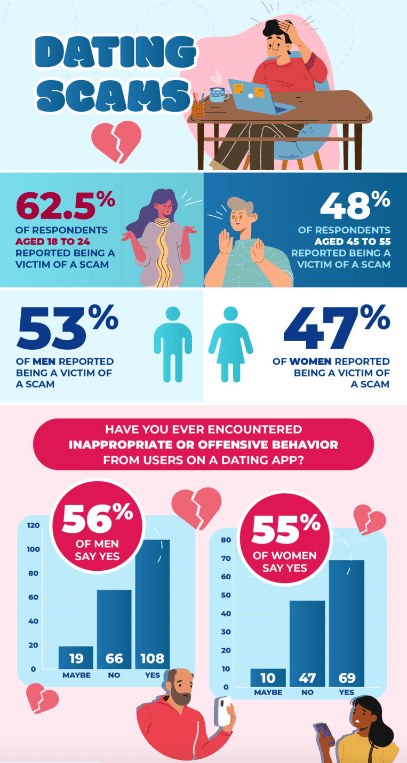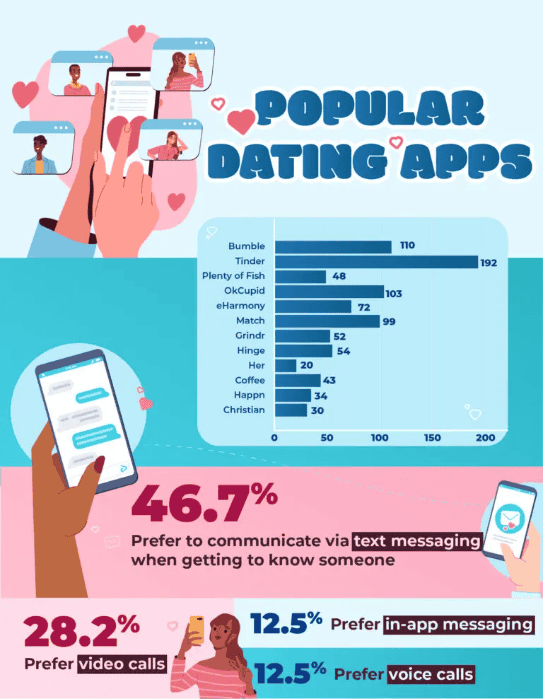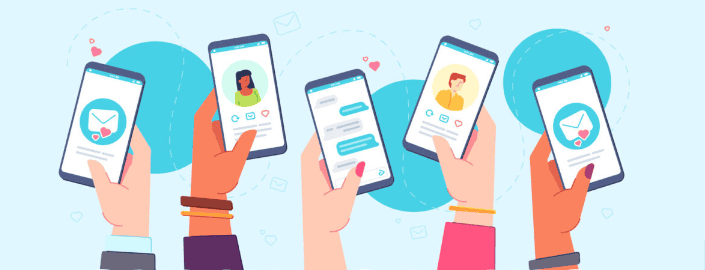When online dating sites like Match.com and eharmony were launched in the mid-1990s, they were met with both excitement and skepticism. Singles no longer had to rely on chance encounters or blind dates to find love, but the notion of meeting a stranger on the internet also seemed pretty scary. Now, 30 years later, a FHE Health survey has found that online dating can lead to negative emotional and mental outcomes in some people.
We broke down the survey’s results below and asked Max Alley, an online dating coach and owner of Match Up Online Dating Coaching, to comment on the findings.
Survey finds dating apps cause stress, especially for new users
The FHE Health survey analyzed data from 320 respondents, all of whom were based in the United States. Most of the participants (65%) said they had been on dating apps for less than a year.
When asked whether they experience stress and anxiety from using the apps, 39.8% of respondents said they experience it “occasionally,” while 16.9% answered “frequently.” Interestingly, men were almost twice as likely as women to say they “never” experience stress or anxiety from dating apps.
What dating coach Max says: “Putting yourself out there and facing rejection can take a toll on mental health and increase stress. A lot of conversations can seem inauthentic, which can lead to stressful cognitive dissonance.”

Young adults face high scam rates on dating apps, survey says
When it came to safety, more than half of the respondents (52.3%) said they had found themselves in an unsafe position from using a dating app. Those numbers were highest among homosexual and bisexual participants.
Scams are also incredibly common. A whopping 62.5% of respondents aged 18 to 24 reported being the victim of a scam. Forty-eight percent of those aged 45 to 55 also said they had been scammed through online dating.
One of the most common terms used when discussing online dating safety is “catfishing” (thanks to the MTV show of the same name), described as using a fake online persona to deceive someone into entering a relationship. Sixty-five percent of women and 57% of men said they had experienced catfishing through dating apps.
What dating coach Max says: “Scams are unfortunately still common on dating apps, and people of all ages are targeted. Always read a dating app’s Trust and Safety Guide to learn how to spot scams and be careful when giving out your phone number or other personal information.”

Online datings emphasis on looks impacts mental health
In today’s world of over-the-top filters and AI enhanced images, it’s not hard to imagine that online dating might have a negative impact on one’s self esteem and mental health.
When asked if the emphasis on appearance or physical attraction in online dating affected their mental health, 13.8% of the respondents said “significantly.” An additional 31.7% said “moderately,” and 36.4% said “slightly.” However, 12% of those aged 18-24 said the emphasis on looks had actually improved their mental well-being.
Surprisingly, when asked about self-esteem, far more respondents said that dating apps had influenced their self-esteem in a positive way (53.2%), rather than in a negative way (24.4%).
What dating coach Max says: “It’s hard to sum up an entire person by using a selection of six or less photos. Some people might feel as though the limited scope of a dating profile doesn’t provide enough insight into their true self. If a person feels like they are being misunderstood or misrepresented, it can be very stressful.”

Majority of online daters take breaks to combat fatigue
Even if online dating doesn’t seriously affect your mental or emotional health, it can still be exhausting. That’s why it’s important to take a break when needed. In fact, the vast majority of respondents – 62% of men and 61% of women – said they had done exactly that at some point. That’s saying a lot, since most of the participants reported being new to online dating.
Alley, who has spent five years learning the ins and outs of every dating app on the market and has coached hundreds of happy clients, clearly believes in the power of online dating – but he’s also aware of the need to step back when necessary.
“Dating app fatigue is real, and you should consider taking a break if you’re feeling overwhelmed. Today’s apps make it easy to do that by allowing users to pause their profiles. This doesn’t affect algorithms negatively and allows you to take time away to breathe,” he said.






